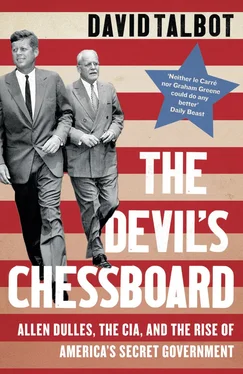Although Dulles and Jung met face-to-face in early 1943, Mary also continued to serve as the main link between the two commanding men in her life. Both men were excited by the idea of forging a pioneering marriage between espionage and psychology. Dulles’s reports back to Washington were filled with Jung’s insights into the Nazi leadership and the German people. Jung even correctly predicted that an increasingly desperate Hitler would likely commit suicide. Mary’s appointments with Jung became dominated by Dulles’s “ask Jung” questions, to the point that they more closely resembled espionage briefings than therapy sessions.
Dulles was so enamored with the flow of provocative psycho-political perceptions from Jung that he gave the psychologist anOSS number—Agent 488. After the war, the spymaster hinted broadly to a Jung family friend that the sage of Zurich had even contributed to the Allied cause by leaking information he had gleaned from sessions with patients who were connected to the enemy side. But this might have been an exaggeration from a spy chief who liked to pride himself on all the influential personalities he had in his pocket.
While Dulles valued Mary as a go-between with men like Jung, he also found more personal uses for her. One morning he came rushing into her apartment when he knew that her husband was away on business. “ Quick!” he barked, dispensing with any foreplay. “I’ve got a very tricky meeting coming up. I want to clear my head.” When he had finished with her, Dulles quickly headed for the door. “Thanks,” he said over his shoulder. “That’s just what I needed!”
Afterward, Mary resolved to tell Dulles that she would no longer cooperate in “clearing his head,” no matter how stressful his upcoming meetings were. But she continued to make herself available to him.
The spy chief was confident enough in his control over Mary that he felt he could loan her out to a German Abwehr agent with whom Dulles had established a relationship. Dulles arranged for Mary, who was fluent in German, to work with the tall, imperious Nazi double agent Hans Bernd Gisevius on his memoirs. Gisevius had secretly turned against Hitler after his once promising Gestapo career had stalled, and in frustration he began feeding Dulles important inside information on German military operations. One day, Gisevius, who had grown enamored of Mary as they toiled together over his manuscript, begged her to come with him to Lugano, where he would have use of a “beautiful apartment” and where he would be meeting with the first chief of the Gestapo, Rudolf Diels. The invitation appealed to Mary’s appetite for danger, but she turned it down. When she told Dulles about it, he was upset, not because he had a rival for his mistress’s affections, but because she had missed an opportunity to squeeze more information out of the amorous German. “ Why the hell didn’t you go?” he snapped at her. “It might have been very interesting.”
Mary did, in fact, later become Gisevius’s lover. But, as she confided to Jung, shuttling back and forth between the two men proved to be emotionally draining.
Gisevius became one of the principal conspirators in the July 20, 1944, bomb plot against Hitler, barely fleeing with his life to Switzerland after it failed. When she discussed her German lover’s exploits with Jung, he was unimpressed with Gisevius’s moral character. The Abwehr man was fighting for the same thing that Hitler possessed, Jung told Mary: “pure power.” He added that Gisevius and his rival in the conspiracy ring, General Claus von Stauffenberg, “were like a pair of lions fighting over a hunk of raw meat.” When she gave Jung some pages from Gisevius’s book for his reaction, he pronounced them “ saturated with Nazi ideology.”
Jung told Mary that she would always attract “extremely ambitious men interested in gaining power for themselves.” She would never be the type of woman who judged men like this, whatever their moral flaws. “ Power was my natural element,” she later reflected. “I felt as at home in situations of power as a fish did in water.”
Dulles would gain notoriety for his promiscuity—at least among his biographers, some of whom expressed greater disdain for his sexual indiscretions than for his more egregious moral failings. But by Mary’s standards, he was by no meanssexually reckless. She took umbrage when British traitor Kim Philby described Dulles as a “womanizer” in his memoir. “Kim Philby of all people!” she harrumphed. “[Allen] was nothing of the kind.”
One evening, while warming themselves by the fireplace at Herrengasse, Mary fell into conversation with Dulles about Napoleon’s love life. She told him that she had read that the great conqueror had enjoyed nine women during his life. “Nine!” exclaimed Dulles. “I beat him by one!” Mary was amused by Allen’s boast. “To anyone born in the 20th century as I was,” she later noted in her journal, “that seemed a very modest score, particularly for a man who had traveled the world as Allen had. It certainly did not qualify him as a womanizer in my book.”
Dulles was fortunate to find someone like Mary, a woman whose morals were conveniently flexible—or, as she herself put it, a woman with a “sophisticated point of view.” She had a curious way of explaining her moral dexterity, but Dulles certainly would have endorsed her way of thinking. “ In order to engage in intelligence worksuccessfully,” Mary observed, “it was essential to have a very clear-cut idea of your own moral values, so that if you were forced by necessity to break them, you were fully conscious of what you were doing and why.”
But even the sophisticated Mary found herself unnerved by one of her conversations with Dulles. She had observed that despite his cunning reputation, Allen always seemed so “open and trusting,” even with people about whom he clearly harbored suspicions or whom he “actually had the goods on.” As he listened to Mary, Dulles grinned. “ I like to watch the little micesniffing at the cheese just before they venture into the little trap,” he told her. “I like to see their expressions when it snaps shut, breaking their little necks.”
Mary was taken aback by this outburst. She told him she found it repellent, but Dulles would have none of her outrage. “What’s the matter with you?” he said. “Don’t you realize that if I had not caught them, they were about to catch me?” It did not occur to Mary to ask why “little mice” could be so threatening, or how he could take such pleasure from their suffering.
Clover Dulles had great hopes for her second daughter, Joan, after she graduated from Radcliffe College in 1944, where many of her classes had been integrated with Harvard’s due to the wartime shortage of professors. Clover wanted her daughter to escape the confinements of domestic life by pursuing a life of adventure. After graduating, Joan joined the Frontier Nursing Service, an organization that imported British midwives—because midwifery was outlawed in America—to help deliver babies in the back hills of Kentucky. Joan escorted the midwives on horseback through the remote hills and hollows of the Bluegrass State, sometimes riding for as long as five hours to reach their destinations. The young woman was enchanted by the beauty of the Kentucky backcountry and was thrilled by the rugged work.
In April of the following year, as the war was coming to an end, Joan sailed for Europe with her aunt Eleanor, who was on a diplomatic assignment to Austria, a country that was rapidly turning into a front line in the Cold War. Vienna, which was divided into Allied occupational zones, was suffused with the danger and intrigue later displayed in the 1949 film The Third Man . Joan was once threatened with arrest by Russian soldiers as she traveled by train through the Soviet zone. Government officials in the Western zones often disappeared off the streets, snatched by Soviet agents.
Читать дальше











